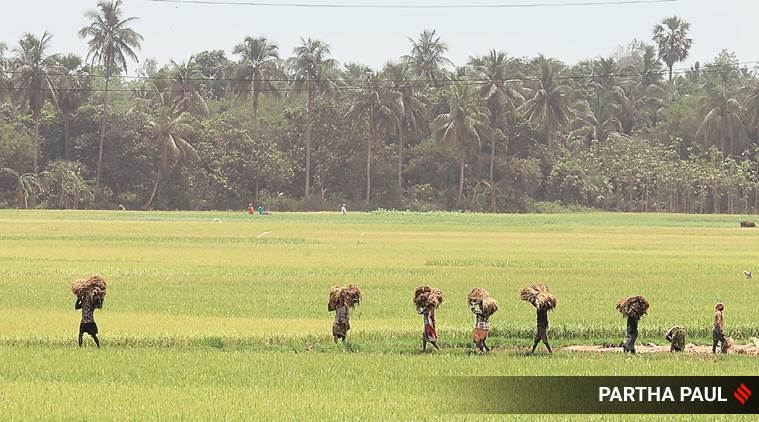
The Indian Express
Paddy farming: How migrant crisis has spurred a shift to direct seeding method
But for this farmers need uninterrupted power supply immediately, a need the govt is yet to fulfill
by Anju Agnihotri ChabaThough paddy sowing is slated to begin from June 10, farmers’ organisations in Punjab have started protesting against the state government and Power State Power Corporation Limited (PSPCL), demanding 16 hours’ uninterrupted power supply with immediate effect.
Transplanting consists of preparing seedlings in a nursery and then planting these seedlings in the fields. The Punjab government provides farmers 8 hours’ uninterrupted power supply to run tubewell motors to irrigate paddy fields from the official date of sowing every year.
The Indian Express explains the reason behind the farmers’ demands:
Why farmers are demanding uninterrupted power supply with immediate effect?
Farmers say that this time, a large number of them are adopting the ‘direct seeding rice’ (DSR) method, which is done much before normal paddy translating starting from June 10, and for which the power supply is needed to irrigate fields.
“This time, due to the lockdown, there is a huge shortage of skilled migrant labourers from Uttar Pradesh and Bihar states who come to Punjab for transplanting paddy in June. Locally available labour is not as fast as migrant labour when it comes to paddy translating — a backward walking transplanting process in the puddle fields. Many migrant labourers have also returned to their home states. In such a situation, a large number of farmers have been left with no option but to opt for DSR, which does not need paddy nursery to transplant but simply sows rice seed in the filed directly with the help of several types of machines including DSR machine, Lucky Seeder and with the help of some other modified machines,” said farmers and agriculture experts.
As this technique does not need puddling (flood irrigation of field) before sowing but just a simple good moistured land.
How far is the farmers’ demand valid?
Some farmers in Punjab have already started the DSR process from May 10 and said it should be done May 20 — 25 days before normal paddy translating. “It can be started anywhere between May 15 and May 20 and DSR sowing needs a ‘rauni’ (pre-sowing irrigation). One field needs five hours’ water supply from a tubewell to get it filled,” said farmer Gurvinder Singh Bajwa, who has been using the DSR method for the past decade in of Sarchur village of Batala sub-division under Gurdaspur district, adding that they are getting four hours’ power supply and after tripping, the supply lasts only three hours, which is inadequate.
Also, the number of DSR machines is very low in Punjab and most farmers are hiring these from each other. “Uninterrupted water supply can ensure irrigation of 4-5 acres fields in two days. A small farmer with 5 acres can hire a DSR machine for a day to sow rice in all his fields in one day but if it takes one day to irrigate one acre then he cannot get a DSR machine for five days to his field,” added Bajwa, who is also a member of several progressive farmers groups of Punjab. A DSR can sow 7-8 acres land in a day.
Why is uninterrupted power supply needed for DSR?
Though DSR does not need puddling of the field before paddy sowing, after wheat harvesting, farmers need to prepare the field for DSR. “After wheat harvesting, the stubble is used for making fodder while leftover stubble is either burnt ploughed into the fields by rotavator or cultivator or disk harroes — all tractor mounted machines. Before running rotavator or cultivator, a ‘rauni’ is required which lets leftover stubble roots get mixed in soil when a cultivator is run to prepare the field for DSR,” said farmer Sukhjit Singh of Diwal village in Ludhiana, who has been doing DSR on around 30 acres of land for the past several years.
“Also if a farmer is sowing rice with simple DSR machine, which does not have weedicide spray pump like Lucky seeder machine which sows and sprays weedicide simultaneously, then more water is required for the field after spraying of weedicide, which is done within 24 hours of sowing with DSR. This watering is needed to make a layer of weedicide, which is done with separate pumps, on the land,” said Bajwa, adding that is sowing done May 15, after which first watering is required by June 5, while the government will provide uninterrupted power supply only on June 10.
What is the farmer organisations’ argument regarding uninterrupted power supply?
Bhartiya Kisan Union (BKU) Dakaunda General Secretary Jagmohan Singh said not providing uninterrupted power supply before June 10 means the government is promoting the traditional puddle method of paddy transplanting, which is highly water consuming and will also lead to delay in paddy sowing in light of labour shortage this time. “If the government really wants to cover all proposed 27 lakh hectare under DSR, it needs to supply uninterrupted power supply with immediate effect to cover more and more area under DSR, which can be done only within the next week or 10 days otherwise a huge area will be left for traditional paddy transplanting, which would be a big challenge in the absence of skilled labour,” stressed Jagmohan.
He also said that the number of DSR and Lucky seeder machines is very low in Punjab in comparison to the area under rice.
Jagmohan also said that the government might be fearing that if uninterrupted power supply is given now, farmers may opt for puddling transplantation, but the government must understand that it is not possible because for puddling translation a farmer needs a 30-35 days nursery which is not available because they have either sown nursery on May 10 or after, which will not be transplanted before June 10 in any case.